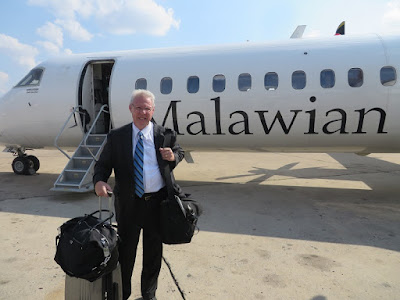I. Introduction
A. Our Time in Malawi
In early November 2014, my wife (Carole) and I flew from the
United States to Blantyre, Malawi, to serve for 18 months as senior
missionaries for The Church of Jesus Christ of Latter-day Saints (the Mormon
Church). The flight from Salt Lake City
to Malawi was interrupted by a short 24-hour layover in Lusaka, Zambia, where
we met for the first time, and briefly, President Erickson, who presides over
the Lusaka Zambia Mission, covering the two land-locked countries of Zambia and
Malawi. As the senior Church leader in
the area, President Erickson has two primary responsibilities: first, to oversee the activities of the 70
plus full-time missionaries laboring in the area, and second, to act as the
presiding leader for all Church members (approximately 5,000) residing in
Zambia and Malawi.[1] He and Sister Erickson were, at the time,
about 18 months into their 3-year assignment, so we will head home about the
same time as the Ericksons. After
interviewing us, and providing some background information, President Erickson
confirmed we would be assigned to labor in Blantyre, working initially in the
Zingwangwa Branch, one of the local four units.
The next day we were back on a plane, heading for Malawi, a small
southeast Africa country, of 17 million, encircled by three larger African
nations—Mozambique on the south; Zambia to the west; and Tanzania on the
northwest.
Keeping a diary or journal of our time in Malawi would not
be uncommon—many missionaries do that—to remember people, places and
events we would likely forget without the benefit of a daily record. But what is perhaps strange is my choice to
tackle this project—which, whatever it might be called, is surely not a diary. I write for
the same reason many have kept journals or diaries or kept notes in the
past—the desire to make sense, for myself, of the experience we are having in
Malawi. Almost everyday Carole and I
comment on how strange and bewildering we find Malawi and its people. I know there is much I should and can learn
from this experience, but these lessons, I fear, will be lost unless I force
myself to think through what we are seeing and feeling.
[1]
When we arrived in the Zambia Lusaka Mission in early November 2014, the
Mission had three districts, comprised in each case of seven to
four branches—Lusaka, Zambia; the Copperbelt in Zambia; and Blantyre,
Malawi. At the time, the four units in Lilongwe
(Malawi’s capital) were not organized as a district, reporting directly to a district presidency, but instead operated under the jurisdiction of the Mission President. Yet
even in the short seven months we have been here, the Church’s organization has
continued to evolve. In April 2015, the seven
units in Lusaka were reorganized as “wards” and combined in a “stake;” once
that occurred, the new Lusaka Stake was no longer under jurisdiction of the
Mission, but reported directly to the Area Presidency of Southeast Africa, with
its head offices in Johannesburg, South Africa. In addition, in May 2015, the Church combined
the four units in Lilongwe into the new Lilongwe District, calling a new
district presidency to preside over the Church members living in central
Malawi. The Blantyre District has a
group located in Liwonde, an hour and a half ride to the northeast, consisting
of approximately 80 members. Ironically,
the first presence of the Church in Malawi was the group in Liwonde. Up in the northern district of Malawi there
are three groups (one in Mzuzu, another in Nkhata Bay), meeting each Sunday,
one of which has, I am told, over a 100 regular attendees. While these groups operate without the benefit
of any formal Church sanction, their participants are committed to learning about
the Church on their own with no support from the Church. They have no authorized leaders and are not
entitled to pass the sacrament or conduct formal Church meetings. No one in these groups has the authority to baptize
new members. They are waiting for the day
the Church is prepared to establish new units in the northern district of Malawi.
The Church is not prepared to take those
steps until it is confident that a structure is in place, and leaders and
missionaries readily available, to support and nurture the new members.
Photos Related to First Installment: I. Introduction--A. Our Time in Malawi
Carole and I are in the Provo MTC, pointing out the location of Malawi, one of the smallest countries in southeast Africa.
This photo was taken when we first arrived at the Mission Home in Lusaka, and were greeted by President and Sister Erickson. At the time, Carole and I had been in transit for close to 40 hours and were barely functioning.
The infamous board in the Mission President's office, showing all of the existing or, in a few cases, pending assignments.
This photo would have been taken shortly after our arrival in Lusaka, posed in front of the plane taking us from Johannsburg to Lusaka.


 t
t


No comments:
Post a Comment